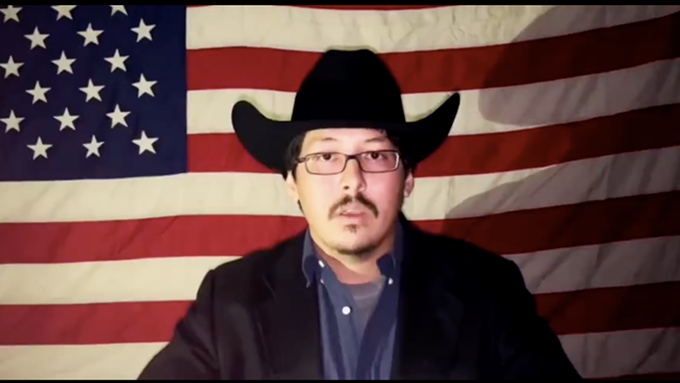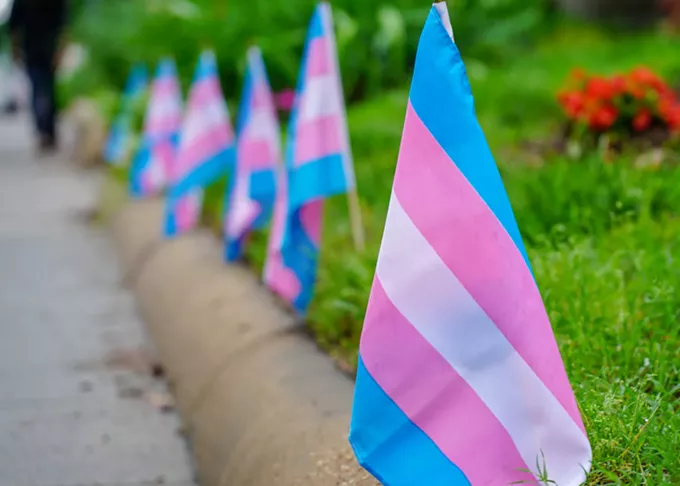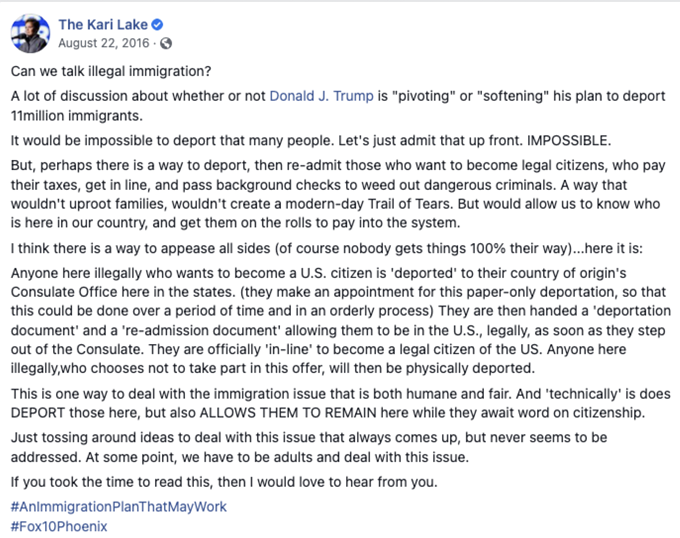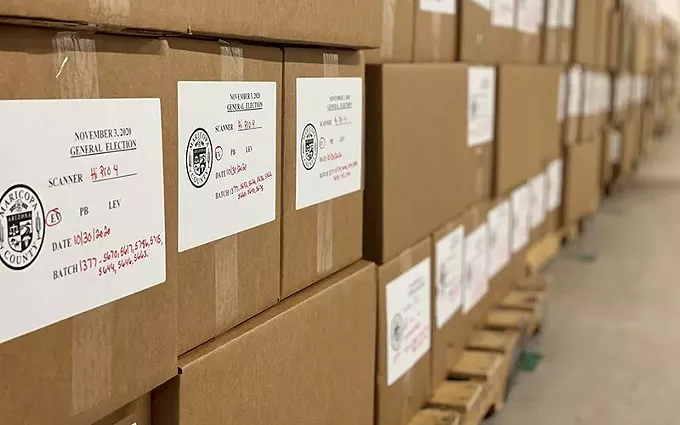Thursday, April 7, 2022
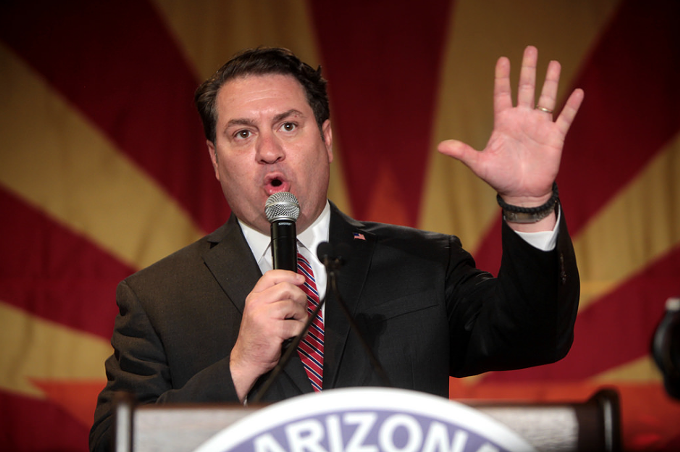
Brnovich is in his flop era … Everyone wants to win Arizona … And little bit of prosciutto.
Editor's note: The Arizona Agenda is a Substack newsletter about Arizona government and politics run by Rachel Leingang and Hank Stephenson. You can find their archives and subscribe at arizonaagenda.com.
Attorney General and U.S. Senate candidate Mark Brnovich tweeted out a 12-page “interim report” on his investigation into the Cyber Ninjas’ claims yesterday that went hard at the top, saying he has “uncovered instances of election fraud” and discovered “serious vulnerabilities” in our elections system that “raise questions about the 2020 election in Arizona.”
But the 11 remaining pages quickly fizzle into what liberals and MAGAs both mocked as a press release seeking to bolster his slipping position in the U.S. Senate GOP primary.
Monday, April 4, 2022
It's comeback season for politicians ... It's lawsuit season for bills ... And Gosar sees the light?
Editor's note: The Arizona Agenda is a Substack newsletter about Arizona government and politics run by Rachel Leingang and Hank Stephenson. You can find their archives and subscribe at arizonaagenda.com.
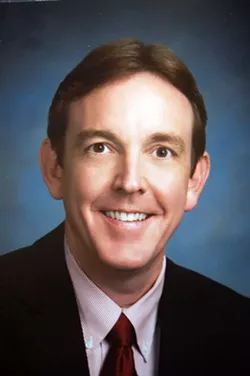
Today is the deadline for candidates to file nominating petitions to qualify for the ballot. And while some are still struggling to gather signatures and ultimately won’t make it, a host of former politicians and interesting newcomers have already qualified to run for office in 2022.
Let’s focus on the Legislature, where more than a dozen former politicians hope to make their triumphant return to public office. Many of those hoping to return to the $24,000 per year salary had rocky runs as elected officials or have hit hard times since.
Take, for instance, Legislative District 1, where former Republican Rep. Noel Campbell is seeking a comeback as a state Senator. After leaving office, Campbell’s wife accused him of domestic violence and said she believes he’s in the beginning stages of dementia. He’ll face Yavapai County Republican Steve Zipperman and, perhaps, former Senate President Ken Bennett a once respected voice in state policy who was last spotted in an off-again, on-again relationship with the Cyber Ninjas.
Thursday, March 31, 2022
The FEC sent a letter to conspiracy theorist Ron Watkins’ campaign this week asking for explanations after his campaign filed an amended campaign finance report that showed he initially failed to report nearly $21,000 — about 40% of what he says he has raised.
“Failure to adequately respond by the response date noted above could result in an audit or enforcement action,” the FEC wrote to Watkins, who also serves as the treasurer of his campaign. He has until Saturday to respond. The FEC also noted that Watkins’ amended disclosure also does not fully disclose the names, addresses and information of some prominent donors, details that are required by federal election law.
Several entries for people who donated amounts in the thousands of dollars have “info requested” listed under their occupation, which the FEC said was “not considered acceptable.”
“You must provide the missing information, or if you are unable to do so, you must demonstrate that ‘best efforts’ have been used to obtain the information,” the letter says.
In Watkins’ original campaign finance report filed at the end of last year, the man who is widely believed to have been behind QAnon’s master account reported having received $30,589. In the amended filing made on March 24, Watkins reported having $51,214.
Watkins also reported more expenditures and cash on hand in the amended report.
In the initial filing, Watkins reported having around $15,000 on hand after spending about $17,000 on operating expenses. The amended report shows the campaign really had twice as much cash, reporting $30,299 on hand after spending nearly $23,000.
Watkins also left out a $2,300 airfare expenditure and a “COVID Test” in his original filing report, both billed to Asiana Airlines.
Prior to coming to Arizona, Watkins was living in Japan for about a year. Before that, he had also lived in China and the Philippines, where the online image boards 8chan and 8kun were based.
“Ron Watkins isn’t new to putting out false information, but there are much greater consequences for lying to the FEC than to users on 4chan,” Campaign for Accountability Executive Director Michelle Kuppersmith said to the Arizona Mirror about the filing. “Ignorance is not a valid excuse for filing false or incomplete reports, and the FEC should consider all appropriate punitive actions if no better reason is offered.”
Watkins did not respond to a request for comment about the filings and the letter from the FEC.
Any response by Watkins to the commission will be public record and the commission will consider it before taking any action against Watkin’s committee. Watkins won’t be able to file for an extension on the letter submitted by the FEC.
Before QAnon, many came to associate Watkins with an online image board called 8chan, which was later renamed 8kun. Watkins didn’t create the site — its founder was Fredrick Brennan, who would later cut ties with the website — but he became its administrator after his father, Jim Watkins, purchased it.
The site has become a hotbed for hosting extremist and illicit content. It has hosted child porn, and white supremacist mass shooters have used it as a platform to spread their manifestos.
The Christchurch shooter in New Zealand said that he frequented the 4chan and 8chan message boards where far-right and white supremacist rhetoric was prevalent, and directly linked to other real-life hate crimes. The website also promoted antisemitism, at one point creating a cryptocurrency for users to boost their posts with a program they called “King of the Shekel.”
However, 8kun’s most active board by far is “Q Research.” As of March 30, the board had more than 1,700 unique users and over 16 million posts.
In launching his campaign, Watkins has begun to distance himself from QAnon, going so far as to claim he is not associated with the movement, however, he still was the headlining speaker at a QAnon conference in Las Vegas with other Arizona candidates.
Brennan, the former administrator of 8chan firmly believes that either Ron or Jim Watkins were the ones behind the QAnon posts, though both men have firmly denied being involved with the postings.
Arizona Mirror is part of States Newsroom, a network of news bureaus supported by grants and a coalition of donors as a 501c(3) public charity. Arizona Mirror maintains editorial independence. Contact Editor Jim Small for questions: info@azmirror.com. Follow Arizona Mirror on Facebook and Twitter.
The article was originally published in Arizona Mirror.
In a move against transgender youth in Arizona, Gov. Doug Ducey signed new laws barring them from participating in girls’ and womens’ sports, and from obtaining gender reassignment surgery.
Senate Bill 1138 prohibits doctors from providing genital reassignment surgery to minors, including mastectomies or mammoplasties to feminize and masculinize a patient’s chest to be more in line with their gender identity. Senate Bill 1165 requires all interscholastic sports to narrowly define gender, effectively denying trans student-athletes the ability to play on the teams most consistent with their gender identity from elementary all the way to university.
“This legislation is common-sense and narrowly-targeted to address these two specific issues — while ensuring that transgender individuals continue to recieve the same dignity, respect and kindness as every individual in our society,” he wrote.
Trans advocates have noted that enacting anti-trans legislation negatively affects the mental well-being of trans children, and may contribute to increased suicide risk. A recent poll from The Trevor Project, a suicide prevention organization for LGBTQ youth, found that as much as 85% of surveyed transgender and nonbinary youth felt debates around anti-trans bills negatively impacted their mental health.
Ducey responded to a question from the Arizona Mirror about this effect by saying that the bill’s intent was to protect girls’ sports.
“(SB1165) was positioned and framed to protect girls’ sports, female sports, and Title IX. And of course, on the subject of mental health with our children, this is something we all have great concern for and great empathy for…I think that Arizona has handled this in the most responsible way possible to keep a level playing field out there for young female athletes and to address the other issues,” he said.
Sponsors of SB1138 have touted it as a reiteration of international standards of care for transgender kids. But opponents say those standards are due to change this year, and codifying old standards can present doctors with a contradiction between following the law and providing best medical care practices for their patients.
“We’re going to be putting doctors in a situation where they’re codifying standards from 10 years ago, and we’re going to put them in a situation where they’re now at odds with new standards,” said Rep. Melody Hernandez, D-Tempe, who is also a paramedic, during a House debate of the bill on March 24.
Proponents of enacting barriers to girls’ sports argue that trans youth have an unfair biological advantage. But the Arizona Interscholastics Sports Medicine Advisory Committee says that’s not a problem that needs solving in the state. Out of the roughly 170,000 students the committee oversees in high schools across the state, it has fielded only 16 appeals from transgender youth since 2017. When reporters pointed this out to Ducey during a brief media availability Wednesday, he deflected, reiterating the bill’s intent.
“We’re going to protect girls’ sports. It’s an issue of fairness,” he said.
Critics say the law pushes Arizona backwards. Just two years ago, a 1991 law banning schools from promoting a “homosexual lifestyle” was repealed, and Kathy Hoffman, Superintendent of Public Instruction in Arizona, tweeted that the new legislation will be equally difficult to deal with later.
“We repealed ‘no-promo homo’ three years ago, a bigoted law that took decades to overturn. Today, (Ducey) sided with extremism, injected politics into our schools, and signed similarly hateful bills,” she wrote.
Last week, similar legislation in Indiana and Utah was vetoed by governors in those states.
The Human Rights Campaign condemned Ducey’s action in comparison to this, saying the move only contributes to nationwide attacks on trans kids. This year saw a record number of anti-trans legislative proposals, with as many as 280 — a spike from last year’s 147 bills.
“Gov. Ducey has chosen discrimination over protecting the well-being of vulnerable children. This isn’t leadership, it’s cowardice,” said Director Cathryn Oakley in an emailed statement.
With the stroke of a pen Wednesday, Gov. Doug Ducey made it illegal for Arizona women to seek an abortion after 15 weeks of pregnancy — even if they became pregnant because they were raped.
The legislation, which will go into effect 90 days after the legislative session ends, was modeled after a Mississippi law that the U.S. Supreme Court is currently considering. Under Senate Bill 1164, doctors would be prohibited from performing the procedure, even if the patient was a victim of incest or rape. Doctors in violation face a class 6 felony and revoked license. A class 6 felony comes with fines, probation and possible prison time between months and up to 5 years.
“In Arizona, we know there is immeasurable value in every life — including preborn life. I believe it is each state’s responsibility to protect them,” Ducey wrote in a signing letter.
“I think if you would look at the statistics on what is already happening in our country, you’d find that this is a very reasonable policy,” he said.
While supporters have championed the measure as in defense of children, opponents argue it actually places undue burden on women.
“Banning abortion will do NOTHING to protect babies, but everything to strip Arizonans of their bodily autonomy & self-determination,” tweeted Rep. Athena Salman, D-Tempe.
The ban comes in the wake of Republican attacks on abortion access across the country, as conservatives anticipate the federal protections will be torn down by the U.S. Supreme Court later this year. A 15-week abortion ban in Mississippi is being contested in Dobbs v. Jackson Women’s Health Organization, which observers predict the high court will uphold. Currently, Planned Parenthood v. Casey makes bans earlier than 24 weeks unconstitutional.
Both the bill’s sponsor, Sen. Nancy Barto, R-Phoenix, and Ducey have cited the upcoming Supreme Court case in defending the legislation’s legality. But Democrats in staunch opposition to the measure say its current unconstitutionality opens it up to legal challenges.
“Arizonans won’t stand for this. We’ll see you in court and at the polls,” tweeted Rep. Melody Hernandez, D-Tempe.
Critics say the move is out of step with the opinions of Arizonans and medical professionals.
Planned Parenthood Action Fund, which advocates for reproductive freedom, denounced Ducey’s approval and said it ignores the varied medical situations women could face.
“Medical professionals in Arizona are against this ban. Nobody asked for this. But Arizona politicians — including the governor today — are willfully ignoring both public opinion and science with the sole goal of stripping constituents of their constitutional rights,” said President Alexis McGill Johnson in a statement.
NARAL Pro Choice America, an abortion rights group, said the bill is incongruent with the actual opinions of Arizonans statewide, citing a survey which found 71% of respondents oppose making abortion illegal, and 90% agree that family planning should be left up to individuals, without government interference.
Secretary of State Katie Hobbs echoed this in a statement her office released shortly after Ducey’s, condemning his action.
“With Governor Ducey’s signature, our elected leaders have chosen to turn their backs on the overwhelming majority of Arizonans who support the constitutional right to choose. Make no mistake — stripping away women’s constitutional rights won’t stop women from seeking access to reproductive health care,” Hobbs, who is running as a Democrat to replace Ducey as governor, said.
This article was originally published in the Arizona Mirror, a nonprofit news organization.
Two years after declaring an emergency in response to what was then a newly emerging COVID-19 pandemic, Gov. Doug Ducey is rescinding that declaration, along with a host of public health policies implemented to curb the spread of the virus.
Ducey on Wednesday officially terminated the statewide emergency declaration he signed on March 11, 2020, the same day the World Health Organization declared that the spread of the coronavirus constituted a pandemic.
“Thanks to the hard work of many — health care workers, businesses, public and private sector employees — COVID-19 is no longer an emergency in Arizona,” Ducey said in a press statement. “This virus isn’t completely gone, but because of the vaccine and other life-saving measures, today we are better positioned to manage and mitigate it.”
Ducey said his decision to end the emergency declaration was based on data from the Arizona Department of Health Services. Interim Director Don Herrington informed the governor on Wednesday that COVID-like illnesses currently represent 1.3% of cases in emergency departments and in-patient wards in Arizona, which is below the 2% threshold the agency set as “the key metric to determine current outbreak status.”
Herrington said that metric indicated “a return to baseline levels and the end of the current outbreak period.”
Since hitting 151,312 COVID-19 cases on Jan. 9, when new infections were surging due to the virus’s omicron variant, case numbers on March 20 dropped to 2,054, Herrington informed Ducey. COVID-related hospitalizations fell from 57% of in-patient beds and 63% of ICU beds at their height in January to 5% and 7%, respectively, during the week of March 15.
And more than 70% of Arizonans have received at least one dose of a COVID-19 vaccine, with 60% being fully vaccinated, Herrington said.
The end of the emergency declaration brings with it the end of various policies at the state and local level. Ducey had already ended most of those policies, such as restrictions on restaurants, other business operations and in-school education.
One policy that existed under the auspices of the emergency declaration that will no longer be in effect is the Arizona Surge Line, according to ADHS spokesman Steve Elliott. Ducey implemented the surge line system in July 2020 to facilitate the transfer COVID-19 patients out of overburdened health care facilities and into facilities with more space.
Elliott said some reporting requirements enacted under the emergency declaration will also come to an end, though many will remain in place due to federal requirements or voluntary reporting. ADHS will still receive data on positive cases, lab reporting, hospitalizations, deaths, immunizations and negative lab results from PCR tests, though not from antigen tests.
Last week, Ducey signed Senate Bill 1309, which allowed temporary professional medical licenses the state issued under the terms of his emergency declaration to continue if he terminated it. More than 2,200 of those licenses, including about 1,200 nursing licenses, are still active, The Associated Press reported. Ducey spokesman C.J. Karamargin said the governor wanted to ensure that the law was in place before lifting his emergency declaration.
The end of the statewide emergency declaration won’t affect any federal funding, ADHS and the governor’s office said. It also won’t affect emergency declarations issued by counties and municipalities.
Maricopa County on Wednesday also ended its emergency declaration.
“I am proud of the staff at the Maricopa County Departments of Public Health and Emergency Management for coming together and leading the way on the response,” Bill Gates, chairman of the Maricopa County Board of Supervisors, said in a press statement. “Their expertise allowed the Board to stay informed and direct resources to areas of the community when and where it was needed.”
Gates noted that the board was responsible for administering emergency federal funding for county operations, rental assistance, cellular hotspots for students who had to shift to remote learning, business grants and support for nonprofit agencies that provided community assistance. The board is still distributing money from the federal American Rescue Plan Act, including $100 million to combat homelessness and help people with housing and utility payments, and $14 million to help people find jobs.
County spokesman Fields Moseley said the supervisors’ decision was unrelated to the governor’s announcement. The Board of Supervisors announced that it was ending its emergency declaration about 20 minutes before the governor did the same.
“It’s been on the radar for a while,” said Moseley.
The primary practical effect of the end of the county’s declaration is that it will end the emergency procurement rules the supervisors enacted early in the pandemic so that it could quickly acquire things like personal protective equipment without going through a competitive bidding process. Contracts that are still in place, such as those for the “isolation hotels” the county uses to shelter homeless COVID-19 patients, will continue.
Arizona Mirror is part of States Newsroom, a network of news bureaus supported by grants and a coalition of donors as a 501c(3) public charity. Arizona Mirror maintains editorial independence. Contact Editor Jim Small for questions: info@azmirror.com. Follow Arizona Mirror on Facebook and Twitter.
This article was originally published on Arizona Mirror.
We're all going to pay for these court cases ... The emergency is over for now ... And a Facebook post from the Kari Lake vault.
Editor's note: The Arizona Agenda is a Substack newsletter about Arizona government and politics run by Rachel Leingang and Hank Stephenson. You can find their archives and subscribe at arizonaagenda.com.
Gov. Doug Ducey signed four bills on Wednesday that will all likely end up in court.
And that’s probably the point. The four bills — one on abortion, two on transgender children and one about election law — all threw up red flags with the Legislature’s constitutional attorneys. But they could find a friendlier court after Trump appointed Republican judges up and down the legal system during his time in office.
The American Civil Liberties Union already said it would sue over the bill banning gender reassignment surgeries for people under age 18. The election bill lawmakers passed is a rehash of a 2004 law that the U.S. Supreme Court struck down, and it will almost certainly face a legal challenge. The trans kids sports bill mirrors laws in other states that have faced lawsuits and not fared well thus far. And the anti-abortion law is clearly unconstitutional — unless the U.S. Supreme Court changes its mind.
SB1164, sponsored by Arizona Sen. Nancy Barto, prohibits abortions after 15 weeks of gestation, unless there’s a medical emergency. Doctors are required to file reports with the state if an abortion is peformed after 15 weeks. And if a doctor intentionally performs an abortion outside this law, they can be charged with a felony and lose their license. People who get an abortion after 15 weeks would not be prosecuted. In his signing letter, Ducey pointed to a lawsuit over a Mississippi anti-abortion law that is nearly the same as the one he signed; that case, Dobbs v. Jackson Women’s Health, is now pending before the U.S. Supreme Court.
In signing HB2492 from Republican Rep. (and banned-from-Twitter troll farmer) Jake Hoffman, Ducey invoked the will of voters back in 2004 to require proof of citizenship to register to vote. But he didn’t explain the constitutional history of that year’s Proposition 200, which was a softer version of HB2492. The U.S. Supreme Court struck down that 2004 law, which also required proof of citizenship beyond what was outlined in the National Voter Registration Act, saying Prop 200 would allow Arizona to reject voters who had satisfied the federal requirements to vote. In court, a lawsuit against this bill could face a different outcome as it heads to a much more conservative court than the one that eventually struck down Prop 200 in 2013.
• Arizona Sen. Warren Petersen’s SB1138 makes it illegal for doctors to perform “irreversible gender reassignment surgery” on anyone under age 18. The law provides a list of acceptable treatments that doctors can provide to minors, including services for sexual development disorders. The law defines what these prohibited surgeries are, and it defines biological sex, gender and gender transition. As originally introduced, the bill would’ve banned the use of hormones and blockers in gender-affirming care, but those measures were amended out. In his signing letter, Ducey said these decisions on irreversible surgeries should be made in adulthood.The US Supreme Court ruled on this in 2013, which is why our system is bifurcated. This new law is purely an attempt to relitigate the matter before a (much) more conservative court. https://t.co/4EbAVeYmI0
— Jim Small (@JimSmall) March 30, 2022
By then, Ducey will be long gone from the governor’s office, and many of the lawmakers who voted for it will likely be out of office, too. But we’ll still be here, paying the legal fees for politicians to test the boundaries of the law.
When we say we’ll be here, we mean us taxpayers — not necessarily the Arizona Agenda. Whether this newsletter survives or dies is up to you, dear reader. If you want us to stay in business, become a paying subscriber today.

Emergency is over, COVID-19 is not: Gov. Doug Ducey ended Arizona’s state of emergency after more than two years, as did Maricopa County. The state of emergency allowed for more on-the-fly policy changes and declarations to track and manage COVID-19. For Ducey, a law that granted temporary licenses for public health workers proved crucial to ending the emergency, the Republic’s Stacey Barchenger reports.
Lawmakers get bold when they’re retiring: Arizona Sen. Paul Boyer, a Republican who will leave office at the end of the year, issued an education funding ultimatum in the Republic’s op-ed pages yesterday. He said he won’t vote in favor of another tax cut to avoid a ballot referral unless the Legislature and governor agree to put $900 million into education to respect the will of the voters after the majority of them approved a tax increase to fund education.
None of the candidate survey responses on election integrity from @AnniLFoster, @Rachel1Mitchell or @GinaGodbehere defend the conduct of their would-be client, the Board of Supervisors, in the 2020 election. They’ve been under fire for a year and a half over fake fraud claims. pic.twitter.com/zx7lk4yXp1
— Jeremy Duda (@jeremyduda) March 30, 2022
Just don’t do it again: Lawmakers asked the Auditor General’s Office to investigate the Secretary of State’s Office, Pima County and Maricopa County for their use of private grants to fund 2020 election duties and to investigate whether Maricopa County followed procurement codes in buying Dominion voting machines. The Auditor General’s Office responded yesterday with a 71-page report that breaks down the spending and says, basically, everything was done within the law.
They’re still beefin’: Attorney General Mark Brnovich wants Cochise County Attorney Brian McIntyre to investigate whether Secretary of State Katie Hobbs’ management of the E-Qual system has broken any laws, Capitol Media Services’ Howie Fischer reports. The move is the latest in an ongoing battle over Hobbs’ decision to temporarily shut down part of the system to update it after redistricting — and it’s the latest in an ongoing beef between Hobbs and Brnovich over virtually everything.
Accounting is hard: Probable Q of QAnon and current Congressional District 2 candidate Ron Watkins initially failed to report more than $20,000 in campaign funds, which he then reported in an amended filing, the Arizona Mirror’s Jerod MacDonald-Evoy reports. The Federal Election Commission wants an answer from Watkins about how he missed the funds the first time.
Put it on Karen’s tab: The tally for legal fees for the Arizona Senate’s audit-related records lawsuits is nearing $500,000, and auditors still haven’t turned over all the records to the media or watchdog groups that requested them.
You’re not seeing things: If you’ve been seeing more Waymo cars in downtown Phoenix, that’s because the company was testing the roads in the area and will launch a passenger ride service downtown similar to the one it offers in the Chandler area, the Republic’s Ryan Randazzo reports. The Phoenix program will start just with Waymo workers, and while the cars are self-driving, they will have drivers in them still.
Interrupting the tenuous agreement: The Arizona Coyotes will move from their Glendale arena to Tempe, but they want to keep their gambling operation intact, which would require a change to state law because the Tempe arena size isn’t large enough to allow a mobile sportsbook, the Associated Press’ Bob Christie reports. The gaming compact approved in 2021 that allowed for sports betting was negotiated among the state, numerous tribes, attorneys and sports teams.
Lake Powell is shrinking. These photos were taken 9 months apart (Top photo 6/23/21 - Bottom photo 3/27/22) at Lake Powell's Lone Rock Beach in Utah. Water levels at the lake are at their lowest level since the lake was created in 1963 by damming the Colorado River. #drought pic.twitter.com/lVJ7aFt2CE
— Justin Sullivan (@sullyfoto) March 30, 2022
Another day, another set of lawsuits: An Arizona death-row inmate’s case will be heard at the U.S. Supreme Court, Cronkite News’ Reagan Priest reports. John Montenegro Cruz claims he was unlawfully denied the right to tell a jury that if he received a life sentence, he would be ineligible for parole. The high court acknowledged that inmates have this right in a 2016 decision, which Cruz argues should make him eligible for a new hearing. In other legal news, Arizona joined a lawsuit against the Biden administration over the federal mask mandate on public transportation.
An unfortunate backslide: After years of gains, Latino student enrollment at community colleges and Northern Arizona University decreased during the pandemic, though Arizona State University and University of Arizona saw increases in Latino student enrollment during the same timeframe, Republic reporter Daniel Gonzalez writes.
New name, old problem: Students who attended the former Ashford University, now an offshoot of the UA called University of Arizona Global Campus, told Phoenix New Times’ Elias Weiss that the rebranded college won’t help resolve the problems they had at Ashford.
Art and commerce: A health center in Cochise County serves patients from both Arizona and Sonora, a recognition that the Douglas and Agua Prieta communities often move across the border, as do infectious diseases, the El Paso Times’ Martha Pskowski reports. Elsewhere in the borderlands, people barred from asylum in the U.S. make traditional art as they wait for help, KJZZ’s Kendal Blust writes.
Weed can’t grow everywhere: In anticipation of the state’s marijuana social equity license lottery drawing, the City of Tucson initiated the process of setting up zoning rules for new social equity dispensaries, the Arizona Daily Star’s Nicole Ludden reports.
Everyone should carry Narcan: Fire stations in Nogales will now carry naloxone that community members can come pick up free of charge, the Nogales International’s Angela Gervasi reports. Naloxone can reverse an opioid overdose, and its accessibility is especially important as overdoses increase across the state in the past couple years.
We actually did have questions about javelinas: And those questions are now answered, thankfully. (They’re not pigs, they kinda stink and you should leave them alone.)

A bill from Fountain Hills Republican Rep. John Kavanagh would create an online database of mugshots and information about undocumented immigrants who commit crimes in Arizona.
House Bill 2326, which awaits a vote from the full Senate, calls on the Arizona Criminal Justice Commission to set up the website and would require courts to report to it with information about the undocumented person’s crime, name, photo, date of conviction, height and weight.
Opponents of the bill say it stokes fear of immigrants and encourages racial profiling, the Republic’s Javier Arce reports. Kavanagh told Arce the point of the bill was to “let people see how much crime (undocumented) immigrants are committing.”

We went this whole week without using the bottom of our email to make fun of Kari Lake — and to celebrate that achievement, we’re making fun of Kari Lake.
Not that her basic lack of knowledge of how government works, or her brand new fondness of guns, or her history of supporting President Barack Obama and other Democrats seem to bother her base of loyal supporters — as long as she smashes TVs and calls reporters names, she’s gonna be the frontrunner!
But here’s a Lake throwback that makes us smile: Lake’s 2016 plan for “paper-only deportations” in which nobody actually leaves the country and everyone is on a path to citizenship.
Monday, March 28, 2022
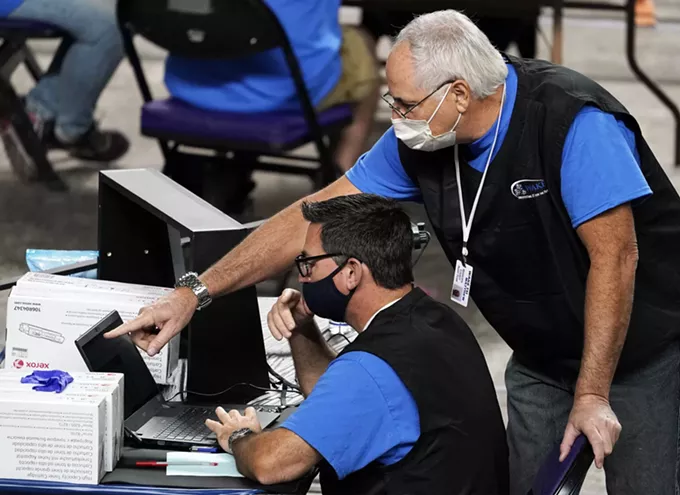
Is speed more important than accuracy? ... David Gowan is back at it ... And Sedona is the real UFO capital.
Editor's note: The Arizona Agenda is a Substack newsletter about Arizona government and politics run by Rachel Leingang and Hank Stephenson. You can find their archives and subscribe at arizonaagenda.com.
Audit fever is once again ripping through the Arizona Senate after Republican Sen. Kelly Townsend subpoenaed the Maricopa County Board of Supervisors to answer more questions for the band of 2020 election-deniers that make up her Senate Government Committee.
Supervisors are preparing to skip the Senate’s spectacle today and send their lawyer instead, setting up another potential meltdown between the two Republican-controlled bodies.
If you’re getting strong déjà vu watching this episode of “Arizona Audit,” that’s because it’s a rerun. Supervisors blew off a subpoena to appear before the Senate last May, when the first audit-related subpoena was coming to a head, just a few weeks before the Senate attempted to jail them.
Thursday, March 24, 2022
About those splunk logs ... More bad news for Doug Logan … And Ducey’s first election integrity test.
Editor's note: The Arizona Agenda is a Substack newsletter about Arizona government and politics run by Rachel Leingang and Hank Stephenson. You can find their archives and subscribe at arizonaagenda.com.
Another of Gov. Doug Ducey’s disciples is attempting to springboard from the Ninth Floor into their own elected office, highlighting both the reach and possibly the limitations of the machine the governor has built during his 12 years in statewide office.
Anni Foster, the governor’s general counsel, became the second current Ducey employee seeking elected office in their own right this year when she joined the GOP primary race to replace Maricopa County Attorney Allister Adel. (That’s after Ducey’s budget director Matt Gress, who’s running for the Legislature from central Phoenix.)
Ducey’s support in the race will be pivotal. Foster’s access to his campaign infrastructure should put her ahead of the pack in the sprint to gather enough signatures to qualify for the ballot before April 4 — not to mention fundraise.
Thursday, March 17, 2022
Each year during Sunishine Week (March 13-19), The Foilies serve up tongue-in-cheek “awards” for government agencies and assorted institutions that stand in the way of access to information. The Electronic Frontier Foundation and MuckRock combine forces to collect horror stories about Freedom of Information Act (FOIA) and state-level public records requests from journalists and transparency advocates across the United States and beyond. Our goal is to identify the most surreal document redactions, the most aggravating copy fees, the most outrageous retaliation attempts, and all the other ridicule-worthy attacks on the public’s right to know.
And every year since 2015, as we’re about to crown these dubious winners, something new comes to light that makes us consider stopping the presses.
As we were writing up this year’s faux awards, news broke that officials from the National Archives and Records Administration had to lug away boxes upon boxes of Trump administration records from Mar-a-Lago, President Trump’s private resort. At best, it was an inappropriate move; at worst, a potential violation of laws governing the retention of presidential records and the handling of classified materials. And while Politico had reported that when Trump was still in the White House, he liked to tear up documents, we also just learned from journalist Maggie Haberman’s new book that staff claimed to find toilets clogged up with paper scraps, which were potentially torn-up government records. Trump has dismissed the allegations, of course.
This was all too deliciously ironic considering how much Trump had raged about his opponent (and 2016 Foilies winner) Hillary Clinton’s practice of storing State Department communications on a private server. Is storing potentially classified correspondence on a personal email system any worse than hoarding top secret documents at a golf club? Is “acid washing” records, as Trump accused Clinton, any less farcical than flushing them down the john?
Ultimately, we decided not to give Trump his seventh Foilie. Technically he isn’t eligible: his presidential records won’t be subject to FOIA until he’s been out of office for five years (releasing classified records could take years, or decades, if ever).
Instead, we’re sticking with our original winners, from federal agencies to small town police departments to a couple of corporations, who are all shame- worthy in their own rights and, at least metaphorically, have no problem tossing government transparency in the crapper.
THE C.R.E.A.M. (CRAP REDACTIONS EVERYWHERE AROUND ME) AWARD: U.S. MARSHALS
The Wu-Tang Clan ain’t nothing to F’ with...unless the F stands for FOIA. Back in 2015, Wu-Tang Clan produced Once Upon a Time in Shaolin, but they only produced one copy and sold it to the highest bidder: pharma-bro Martin Shkreli, who was later convicted of securities fraud.
When the U.S. Marshals seized Shkreli’s copy of the record under asset forfeiture rules, the Twitterverse debated whether you could use FOIA to obtain the super secretive album. Unfortunately, FOIA does not work that way. However, BuzzFeed News reporter Jason Leopold was able to use the law to obtain documents about the album when it was auctioned off through the asset forfeiture process. For example, he got photos of the album, the bill of sale, and the purchase agreement.
But the Marshals redacted the pictures of the CDs, the song titles and the lyric book, citing FOIA’s trade secrets exemption. Worst of all, they also refused to divulge the purchase price—even though we’re talking about public money. And so here we are, bringing da motherfoia-ing ruckus.
(The New York Times would later reveal that PleasrDAO, a collective that collects digital NFT art, paid $4 million for the record.)
Wu-Tang’s original terms for selling the album reportedly contained a clause that required the buyer to return all rights in the event that Bill Murray successfully pulled off a heist of the record. We can only daydream about how the Marshals would’ve responded if Dr. Peter Venkman himself refiled Leopold’s request.
THE OPERATION SLUG SPEED AWARD: U.S. FOOD AND DRUG ADMINISTRATION
The federal government’s lightning fast (by bureaucratic standards) timeline to authorize Pfizer’s COVID-19 vaccine lived up to its Operation Warp Speed name. But the Food and Drug Administration gave anything but the same treatment to a FOIA request seeking data about that authorization process.
55 years—that’s how long the FDA, responding to a lawsuit by doctors and health scientists, said it would take to process and release the data it used to authorize the vaccine. And yet, the FDA needed only months to review the data the first time and confirm that the vaccine was safe for the public.
The estimate was all the more galling because the requesters want to use the documents to help persuade skeptics that the vaccine is safe and effective, a time-sensitive goal as we head into the third year of the pandemic.
Thankfully, the court hearing the FOIA suit nixed the FDA’s snail’s pace plan to review just 500 pages of documents a month. In February, the court ordered the FDA to review 10,000 pages for the next few months and ultimately between 50,000-80,000 through the rest of the year.
THESE 10-DAY DEADLINES GO TO 11 AWARD: ASSORTED MASSACHUSETTS AGENCIES
Most records requesters know that despite nearly every transparency law imposing response deadlines, they often are violated more than they are met. Yet Massachusetts officials’ time-warping violations of the state’s 10-business-day deadline take this public records’ reality to absurd new levels.
DigBoston’s Maya Shaffer detailed how officials are giving themselves at least one extra business day to respond to requests while still claiming to meet the law’s deadline. In a mind-numbing exchange, an official said that the agency considers any request sent after 5 p.m. to have technically been received on the next business day. And because the law doesn’t require agencies to respond until 10 business days after they’ve received the request, this has in effect given the agency two extra days to respond. So if a request is sent after 5 p.m. on a Monday, the agency counts Tuesday as the day it received the request, meaning the 10-day clock doesn’t start until Wednesday.
The theory is reminiscent of the This Is Spinal Tap scene in which guitarist Nigel Tufnel shows off the band’s “special” amplifiers that go “one louder” to 11, rather than maxing out at 10 like every other amp. When asked why Spinal Tap doesn’t just make the level 10 on its amps louder, Tufnel stares blankly before repeating: “These go to eleven.”
Although the absurdity of Tufnel’s response is comedic gold, Massachusetts officials’ attempt to make their 10-day deadline go to 11 is contemptuous, and also likely violates laws of the state and those of space and time.
THE RETURN TO SENDER AWARD: VIRGINIA DEL. PAUL KRIZEK
There are lawmakers who find problems in transparency laws and advocate for improving the public’s right to know. Then there’s Virginia lawmaker Paul Krizek.
Krizek introduced a bill earlier this year that would require all public records requests to be sent via certified mail, saying that he “saw a problem that needed fixing,” according to the Richmond Times-Dispatch.
The supposed problem? A records request emailed to Krizek got caught in his spam filter, and he was nervous that he missed the response deadline. That never happened; the requester sent another email that Krizek saw and he responded in time.
Anyone else might view that as a public records (and technology) success story: the ability to email requests and quickly follow up on them proves that the law works. Not Krizek. He decided that his personal spam filter hiccup should require every requester in Virginia to venture to a post office and pay at least $3.75 to make their request.
Transparency advocates quickly panned the bill, and a legislative committee voted in late January to strike it from the docket. Hopefully the bill stays dead and Krizek starts working on legislation that will actually help requesters in Virginia.
THE SPYING ON REQUESTORS AWARD: FBI
If government surveillance of ordinary people is chilling, spying on the public watchdogs of that very same surveillance is downright hostile. Between 1989 and at least 2004, the FBI kept regular tabs on the National Security Archive, a domestic nonprofit organization that investigates and archives information on, you guessed it, national security operations. The Cato Institute obtained records showing that the FBI used electronic and physical surveillance, possibly including wiretaps and “mail covers,” meaning the U.S. Postal Service recorded the information on the outside of envelopes sent to or from the Archive.
In a secret 1989 cable, then-FBI Director William Sessions specifically called out the Archive’s “tenacity” in using FOIA. Sessions specifically fretted over former Department of Justice Attorney Quinlan J. Shea and former Washington Post reporter Scott Armstrong’s leading roles at the Archive, as both were major transparency advocates.
Of course, these records that Cato got through its own FOIA request were themselves heavily redacted. And this comes after the FBI withheld information about these records from the Archive when it requested them back in 2006. Which makes you wonder: how do we watchdog the spy who is secretly spying on the watchdog?
THE FUTILE SECRECY AWARD: CONCORD POLICE DEPARTMENT
When reporters from the Concord Monitor in 2019 noticed a vague $5,100 line item in the Concord Police Department’s proposed budget for “covert secret communications,” they did what any good watchdog would do: They started asking questions. What was the technology? Who was the vendor? And they filed public records requests under New Hampshire’s Right to Know Law.
In response, CPD provided a license agreement and a privacy policy, but the documents were so redacted, the reporters still couldn’t tell what the tech was and what company was receiving tax dollars for it. Police claimed releasing the information would put investigations and people’s lives at risk. With the help of the ACLU of New Hampshire, the Monitor sued but Concord fought it for two years all the way to the New Hampshire Supreme Court.
The police were allowed to brief the trial court behind closed doors, without the ACLU lawyers present, and ultimately the state supreme court ruled most of the information would remain secret.
But when The Monitor reached out to EFF for comment, EFF took another look at the redacted documents. In under three minutes, our researchers were able to use a simple Google search to match the redacted privacy policy to Callyo, a Motorola Solutions product that facilitates confidential phone communications.
Hundreds of agencies nationwide have in fact included the company’s name in their public spending ledgers, according to the procurement research tool GovSpend. The City of Seattle even issued a public privacy impact assessment regarding its police department’s use of the technology, which noted that “Without appropriate safeguards, this raises significant privacy concerns.” Armed with this new information, the Monitor called Concord Police Chief Brad Osgood to confirm what we learned. He doubled-down: “I’m not going to tell you whether that’s the product.”
THE HIGHEST FEE ESTIMATE AWARD: PASCO COUNTY SHERIFF’S OFFICE
In September 2020, the Tampa Bay Times revealed in a multi-part series that the Pasco County Sheriff’s Office was using a program called “Intelligence-led Policing” (ILP). This program took into consideration a bunch of data gathered from various local government agencies, including school records, to determine if a person was likely to commit a crime in the future—and then deputies would randomly drop by their house regularly to harass them.
Out of suspicion that the sheriff’s office might be leasing the formula for this program to other departments, EFF filed a public records request asking for any contact mentioning the ILP program in emails specifically sent to and from other police departments. The sheriff responded with an unexpectedly high- cost estimate for producing the records. Claiming there was no way at all to clarify or narrow the broad request, they projected that it would take 82,738 hours to review the 4,964,278 responsive emails— generating a cost of $1.158 million for the public records requester, the equivalent of a 3,000-square seaside home with its own private dock in New Port Richey.
THE RIP VAN WINKLE AWARD: FBI
Last year, Bruce Alpert received records from a 12-year-old FOIA request he filed as a reporter for the Times- Picayune in New Orleans. Back when he filed the request, the corruption case of U.S. Rep. William Jefferson, D-New Orleans, was still hot—despite the $90,000 in cash found in Jefferson’s cold freezer.
In 2009, Alpert requested documents from the FBI on the sensational investigation of Jefferson, which began in 2005. In the summer of that year, FBI agents searched Jefferson’s Washington home and, according to a story published at the time, discovered foil-wrapped stacks of cash “between boxes of Boca burgers and Pillsbury pie crust in his Capitol Hill townhouse.” Jefferson was indicted on 16 federal counts, including bribery, racketeering, conspiracy and money laundering, leading back to a multimillion-dollar telecommunications deal with high-ranking officials in Nigeria, Ghana and Cameroon.
By the time Alpert got the 83 pages he requested on the FBI’s investigation into Jefferson, Alpert himself was retired and Jefferson had been released from prison. Still, the documents did reveal a new fact about the day of the freezer raid: another raid was planned for that same day, but at Jefferson’s congressional office. This raid was called off after an FBI official, unnamed in the documents, warned that while the raid was technically constitutional, it could have “dire” consequences if it appeared to threaten the independence of Congress.
In a staff editorial about the extreme delay, The Advocate (which acquired the Times-Picayune in 2019) quoted Anna Diakun, a staff attorney with the Knight First Amendment Institute at Columbia University: “The Freedom of Information Act is broken.” We suppose it’s better late than never, but never late is even better.
THE FOIA GASLIGHTER OF THE YEAR AWARD: LOUISIANA ATTOR- NEY GENERAL JEFF LANDRY
In another case involving the Times- Picayune, the FOIA gaslighter of the year award goes to Louisiana Attorney General Jeff Landry for suing reporter Andrea Gallo after she requested documents related to the investigation into (and seeming lack of action on) sexual harrassment complaints in Landry’s office.
A few days later, following public criticism, Landry then tweeted that the lawsuit was not actually a lawsuit against Gallo per se, but legal action “simply asking the Court to check our decision” on rejecting her records request.
Gallo filed the original request for complaints against Pat Magee, a top aide to Landry, after hearing rumblings that Magee had been placed on administrative leave. The first response to Gallo’s request was that Magee was under investigation and the office couldn’t fulfill the request until that investigation had concluded.A month later, Gallo called the office to ask for Magee and was patched through to his secretary, who said that Magee had just stepped out for lunch but would be back shortly.
Knowing that Magee was back in the office and the investigation likely concluded, Gallo started pushing harder for the records. Then, late on a Friday when Gallo was on deadline for another story, she received an email from the AG’s office about a lawsuit naming her as the defendant.
A month later, a Baton Rouge judge ruled in favor of Gallo, and ordered Landry to release the records on Magee. Shortly after Gallo received those documents, another former employee of the AG’s office filed a complaint against Magee, resulting in his resignation.
THE REDACTING INFORMATION THAT’S ALREADY PUBLIC AWARD: HUMBOLDT-AREA LAW ENFORCEMENT
Across the country, police departments are notorious for withholding information from the public. Some agencies take months to release body camera footage after a shooting death or might withhold databases of officer misconduct. California’s state legislature pushed back against this trend in 2018, with a new law that specifically puts officer use-of-force incidents and other acts of dishonesty under the purview of the California Public Records Act.
But even after this law was passed, one northern California sheriff was hesitant to release information to journalists—so hesitant that it redacted information that had already been made public. After a local paper, the North Coast Journal, filed a request with the Humboldt County Sheriff’s Office under the 2018 law, the sheriff took two full years to provide the requested records.
Why the long delay? One possible reason: The agency went to the trouble of redacting information from old press releases—releases that, by definition, were already public.
For example, the sheriff’s office redacted the name of a suspect who allegedly shot a sheriff’s deputy and was arrested for attempting to kill a police officer in May 2014–including blacking out the name from a press release the agency had already released that included the suspect’s name. And it’s not like the press had accidentally missed the name the first time: reporter Thadeus Greenson had published the release in the North Coast Journal right after it came out.
That isn’t Greenson’s only example of law enforcement redacting already public information: in response to another public records request, the Eureka Police Department included a series of news clippings, including one of Greenson’s own articles, again with names redacted.
THE CLEAR BULLY AWARD: CLEARVIEW
AI Clearview AI is the “company that might end privacy as we know,” claimed The New York Times’s front page when it publicly exposed the small company in January 2020.
Clearview had built a face recognition app on a database of more than three billion personal images, and the tech startup had quietly found customers in police departments around the country. Soon after the initial reports, the legality of Clearview’s app and its collection of images was taken to court. (EFF has filed friend-of-the-court briefs in support of those privacy lawsuits.)
Clearview’s existence was initially revealed via public records requests filed by Open the Government and MuckRock. In September 2021, as it faced still-ongoing litigation in Illinois, Clearview made an unusual and worrying move against transparency and journalism: It served subpoenas on OTG, its researcher Freddy Martinez and Chicago-based Lucy Parsons Labs (none of which are involved in the lawsuit).
The subpoenas requested internal communications with journalists about Clearview and its leaders and any information that had been discovered via records requests about the company.
Government accountability advocates saw it as retaliation against the researchers and journalists who exposed Clearview. The subpoena also was a chilling threat to journalists and others looking to lawfully use public records to learn about public partnerships with private entities. What’s more, in this situation, all that had been uncovered had already been made public online more than a year earlier.
Fortunately, following reporting by Politico, Clearview, citing “further reflection about the scope of the subpoenas” and a “strong view of freedom of the press,” decided to withdraw the subpoenas.
We guess you could say the face recognition company recognized their error and did an about face.
WHOSE CAR IS IT ANYWAY? AWARD: WAYMO
Are those new self-driving cars you see on the road safe? Do you and your fellow pedestrians and drivers have the right to know about their previous accidents and how they handle tight turns and steep hills on the road?
Waymo, owned by Google parent Alphabet Inc. and operator of an autonomous taxi fleet in San Francisco, answers, respectively: none of your business, and no! A California trial court ruled in late February that Waymo gets to keep this information secret.
Waymo sued the California Department of Motor Vehicles to stop it from releasing unredacted records requested by an anonymous person under the California Public Records Act. The records include Waymo’s application to put its self-driving cars on the road and answers to the DMV’s follow-up questions. The DMV outsourced the redactions to Waymo, and claiming that it needed to protect its trade secrets, Waymo sent the records back with black bars over most of its answers, and even many of the DMV’s questions.
Waymo doesn’t want the public to know which streets its cars operate on, how the cars safely park when picking up and dropping off passengers, and when the cars require trained human drivers to intervene. Waymo even redacted which of its two models—a Jaguar and a Chrysler—will be deployed on California streets ... even though someone on those streets can see that for themselves.
#WNTDWPREA (THE WHAT NOT TO DO WITH PUBLIC RECORDS EVER AWARD): ANCHORAGE POLICE DEPARTMENT
“What Not to Do Wednesday,” a social media series from the Anchorage Police Department, had been an attempt to provide lighthearted lessons for avoiding arrest. The weekly shaming session regularly featured seemingly real situations requiring a police response. Last February, though, the agency became its own cautionary tale when one particularly controversial post prompted community criticism and records requests, which APD declined to fulfill.
As described in a pre-Valentine’s Day #WNTDW post, officers responded to a call about a physical altercation between two “lovebirds.” The post claimed APD officers told the two to “be nice” and go on their way, but instead the situation escalated: “we ended up in one big pile on the ground,” and one person was ultimately arrested and charged.
Some in the public found the post dismissive toward what could have been a domestic violence event—particularly notable because then-Police Chief Justin Doll had pointed to domestic violence as a contributor to the current homicide rates, which had otherwise been declining.
Alaska’s News Source soon requested the name of the referenced arrested individual and was denied. APD claimed that it does not release additional information related to “What Not To Do Wednesday” posts. A subsequent request was met with a $6,400 fee.
FWIW, materials related to WNTDW is not a valid exemption under Alaska’s public records law.
By the end of February 2021, the APD decided to do away with the series.
“I think if you have an engagement strategy that ultimately creates more concern than it does benefit, then it’s no longer useful,” Chief Doll later said. It’s not clear if APD is also applying this logic to its records process.
DO AS I SAY, NOT AS I DO AWARD: TEXAS ATTORNEY GENERAL KEN PAXTON
Texas law requires a unique detour to deny or redact responsive records, directing agencies to go through the Attorney General for permission to leave
On Jan. 6, 2021, Paxton (who is currently up for reelection, facing multiple charges for securities fraud, and was reportedly the subject of a 2020 FBI investigation) and his wife were in Washington, D.C. to speak at a rally in support of former President Donald Trump, which was followed by the infamous invasion of the Capitol by Trump supporters. Curious about Paxton’s part in that historic event, a coalition of Texas newspapers submitted a request under the state’s public records law for the text messages and emails Paxton sent that day in D.C.
Paxton’s office declined to release the records. It may not have even looked for them. The newspapers found that the AG doesn’t seem to have its own policy for searching for responsive documents on personal devices, which would certainly be subject to public records law, even if the device is privately owned.
The Travis County District Attorney subsequently determined that Paxton’s office had indeed violated the Texas open records law. Paxton maintains that no wrongdoing occurred and, as of late February, hadn’t responded to a letter sent by the DA threatening a lawsuit if the situation is not remedied ASAP.
“When the public official responsible for enforcing public records laws violates those laws himself,” Bill Aleshire, an Austin lawyer, told the Austin American- Statesman, “it puts a dagger in the heart of transparency at every level in Texas.”
THE REMEDIAL EDUCATION AWARD: FAIRFAX COUNTY PUBLIC SCHOOLS
Once a FOIA is released, the First Amendment generally grants broad leeway to the requester to do what they will with the materials. It’s the agency’s job to properly review, redact and release records in a timely manner. But after Callie Oettinger and Debra Tisler dug into a series of student privacy breaches by Fairfax County Public Schools, the school decided the quickest way to fix the problem was to hide the evidence. Last September, the pair received a series of letters from the school system and a high-priced law firm demanding the removal of the documents from the web and they return or destroy the documents.
The impulse to try to silence the messenger is a common one: A few years ago Foilies partner MuckRock was on the receiving end of a similar demand in Seattle. While the tactics don’t pass constitutional muster, they work well enough to create headaches and uncertainty for requesters that often find themselves thrust into a legal battle they weren’t looking to fight. In fact, in this case, after the duo showed up for the initial hearing, a judge ordered a temporary restraining order barring the further publication of documents. This was despite the fact that they had actually removed all the personally identifiable data from the versions of the documents they posted.
Fortunately, soon after the prior restraint, the requesters received pro bono legal assistance from Timothy Sandefur of the Goldwater Institute and Ketan Bhirud of Troutman Pepper. In November—after two months of legal wrangling, negative press, and legal bills for the school—the court found the school’s arguments “simply not relevant” and “almost frivolous,” as the Goldwater Institute noted.


